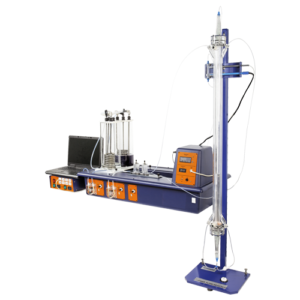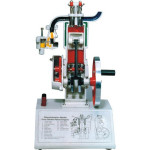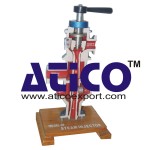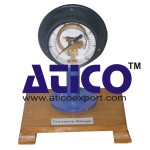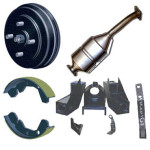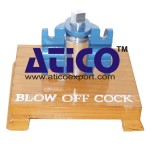Description:
The Laminar flow reactor is a tubular reactor made of clear acrylic, mounted on a floor standing steel frame with two diffusers packed with glass beads located at the ends. A static premixer at the bottom of the column provides premixing of the reagents entering the reactor to improve the flow distribution.
It includes two reagent vessels fitted with heat exchangers, mounted on the plinth. The heat exchangers are used to cool down the reagents before performing the experiment. A cold water jacket keeps the reactor contents at constant temperature in order to maintain the laminar characteristic. A thermostatically controlled supply of chilled water is required.
Experimental Content
- Determination of residence time distribution of a Laminar flow reactor
- Flow pattern characterization – Step change
- Flow pattern characterization – Pulse change
- Study of the reactor response to inlet perturbations: step change
- Effect of flow rate and feed concentration on the determination of flow pattern
- Effect of temperature on the laminar flow characterization
- Demonstration of the flow pattern in the reactor and comparison with the theoretical model
- Determination of the steady-state conversion of a second order reaction
- Effect of flow rate and feed concentration on the steady-state conversion
- Visual monitoring of the steady state
Specification:
- A small scale laminar flow reactor (400ml working volume) designed to demonstrate both flow pattern characterization and steady-state conversion in a tubular reactor
- The reactor column is 1300mm long including diffusers packed with glass beads
- A static premixer is fitted at the base of the column
- Reactor column is jacketed with easy connections for recirculating cooling system
- A feed assembly is supplied with the reactor which consists of two pulsation dampers mounted on a base plate, special lids for Service Unit reagent vessels and PTFE interconnecting pipe
- Stainless steel coils are mounted on the reagent vessel lids to cool their contents. Quick-release connectors allow easy supply of cold transfer medium to the coil and reagents
- The unit is mounted on a painted frame and includes a sensor block for conductivity and temperature sensors
- Can perform flow visualization where the progress of the reaction can be monitored visually using colour
- Can also perform true reactions where the progress of the reaction is recorded using the conductivity sensor and compared with the theory

